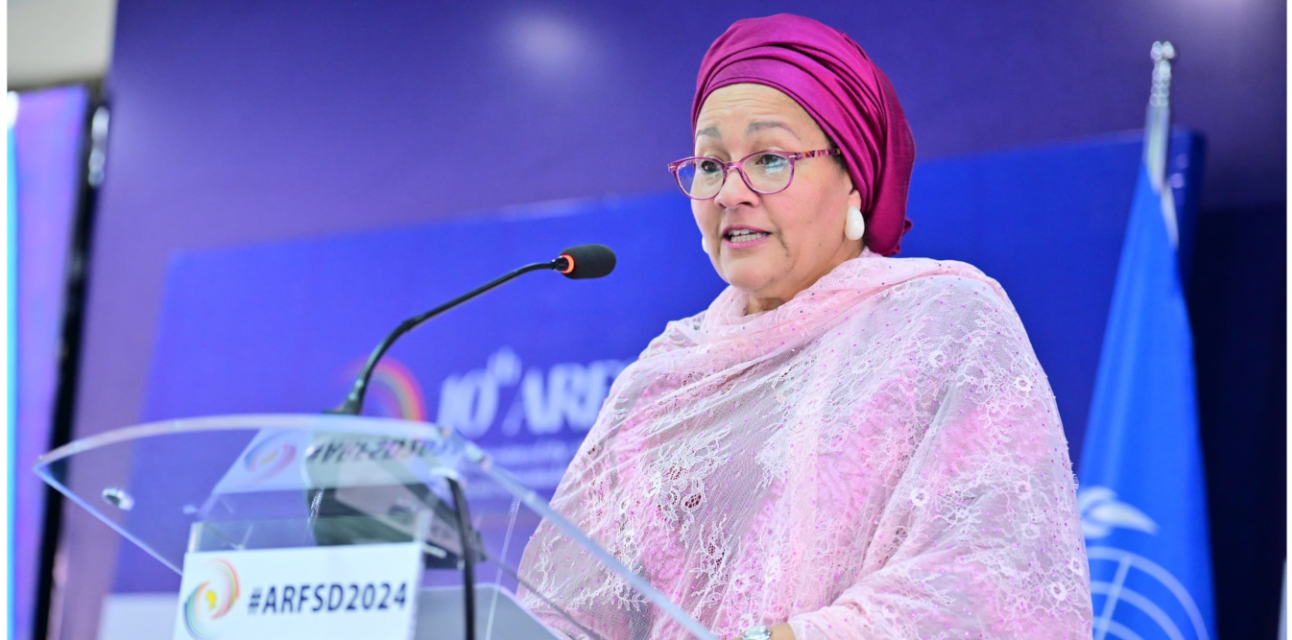
Our Projects are
Transforming African Trade
Quick Contacts
2nd Floor, Fidelity Insurance Centre Waiyaki Way, Westlands

IN a strong call to stakeholders at the opening of the tenth Africa Regional Forum on Sustainable Development, ARFSD-10, in Addis Ababa, Ethiopia, Amina Mohammed, UN Deputy Secretary-General said urgent action is needed to increase capital flows into developing countries, particularly in Africa to make the SDGs stimulus a reality.
She also urged the international community to support Africa in its efforts to deliver its vision for development through the SDGs 2030 agenda and Agenda 2063.
Mohammed told the multi-stakeholder forum of member states representatives, youth, civil society and private sector actors that African countries are facing significant challenges, including debt servicing, rising interest rates and limited fiscal space.
“Debt servicing in Africa is at an all-time high due to external shocks, leaving very little fiscal space or nothing to invest in sustainable development.” Furthermore, debt servicing “accounted for a staggering 47.5% of government revenue in Sub Saharan Africa last year. This is the primary expenditure on essential services, as well as investments in the continent’s future in areas of education and health,” she said.
According to Mohammed, at least $500 billion a year is needed to scale up affordable long-term financing for development, alongside structural reforms within the very institutions and rules that make up the international financial architecture.
Echoing the Deputy Secretary-General, Robinah Nabbanja, Prime Minister of Uganda, stressed the need for reform of the global financial architecture to ensure favorable financing terms, stressing the need for long-term financing for developing countries to trigger sustainable economies. She said climate-smart agriculture, technology and innovation are the key drivers for sustainable development on the continent.
The 10th ARFSD is being held under the theme, “Reinforcing the 2030 Agenda for Sustainable Development and Agenda 2063 and eradicating poverty in times of multiple crises: effective delivery of sustainable, resilient and innovative solutions.”
Claver Gatete, Executive Secretary, Economic Commission for Africa, ECA, for his part stressed the need for “Innovative financing mechanisms, coupled with reforms in the global financial architecture”, to unlock new avenues for sustainable investment and inclusive growth in Africa.”
He underscored the need to leverage Africa’s vast natural resources, particularly critical minerals which are essential for the global transition to green economies. He also said renewable energy stands as a backbone for sustainable development, “with untapped opportunities to drive investments and promote energy security across the continent.”
Gatete touched on the six transition pathways that the UN system has identified as key investment pathways for SDGs delivery. These are: food systems; energy access and affordability; digital connectivity; education; jobs and social protection; and climate change, biodiversity loss and pollution- he said, are key investment pathways for SDGs delivery.
The ECA Executive Secretary also noted that climate challenges in Africa are reducing budgets by up to 5% of GDP annually against the backdrop of high infrastructure and climate change needs that are estimated to cost between US$68 billion and US$108 billion annually.
“The African Continental Free Trade Area, AfCFTA, presents a unique opportunity to boost agribusiness and enhance food security, a cornerstone of resilience in the face of multifaceted challenges,” said Mr. Gatete.
Deputy Chairperson, African Union Commission, Monique Nsanzabaganwa noted that African leaders adopted the second tier implementation of the Agenda 2063 which demonstrated their unwavering commitment to realizing the aspirations of Africans.
“Countries should innovate and create strong institutions, that are accountable and deliver to the citizens,” she added.
Msanzabaganwa also noted that domestic resource mobilization is the responsibility of governments and there is a need for a fair and inclusive global taxation regime.
Speaking on behalf of the President of the Federal Democratic Republic of Ethiopia, Sahle-work Zewde, Fitsum Assefa, Minister of Planning and Development urged countries to “encourage youth driven innovations as a powerful force in our match towards the SDGs to catalyze transformative change, accelerate progress and unlock new opportunities for inclusive development and poverty eradication.” She added that Ethiopia has made progress in mobilizing domestic and international resources for rapid and sustained economic growth and development. This experience could be benchmarked by other countries for accelerated implementation of the remaining goals of the strategic plan.
The Chair of the outgoing bureau of the ARFSD, Niger’s Hydraulics, Sanitation and Environment Minister, Maizama Abdoulaye stressed the importance of commitment by countries to implement inclusive sustainable development to turn the continent into one full of opportunities. Abdoulaye said that Africa should invest in blue and green bonds which require investment in infrastructure.
Read original article
Disclaimer: The views and opinions expressed in this article are those of the authors and do not necessarily reflect the official policy or position of TradeMark Africa.